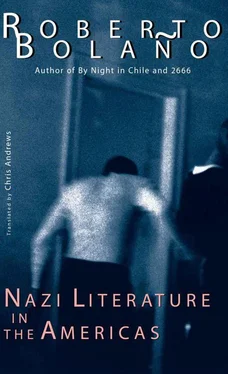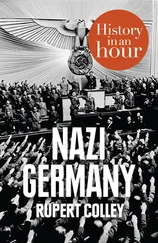ITINERANT HEROES OR THE FRAGILITY OF MIRRORS
Bogotá, 1911–Berlin, 1945
The only son of one of Bogotá’s best families, Ignacio Zubieta was destined for pre-eminence from the start, or so it seemed. A good student and an outstanding sportsman, at the age of thirteen he could write and speak fluent English and French. By virtue of his bearing and manly good looks he stood out wherever he happened to be; he had a pleasant manner and a remarkable knowledge of classical Spanish literature (at the age of seventeen, he published a monograph on Garcilaso de la Vega which was unanimously praised in Colombian literary circles). He was a first-rate horseman, the best polo player of his generation, a superb dancer, always irreproachably dressed (although with a slight tendency to favor sportswear), a confirmed bibliophile, and lively but free of vices; everything about him seemed to foretoken the highest achievements, or at least a life of valuable service to his family and the nation. But chance or the terrible historical circumstances in which he happened (and chose) to live warped his destiny irreparably.
At the age of eighteen he published a book of verse in the style of Góngora, recognized by the critics as a valuable and interesting work, but which could certainly not be said to bring anything new to the Colombian poetry of the time. Zubieta realized this, and six months later left for Europe accompanied by his friend Fernandez-Gómez.
In Spain he frequented the high-society salons, which succumbed to his youth and charm, his intelligence and the aura of tragedy already surrounding his tall, slender figure. It was said (by the gossip columnists of the Bogotá newspapers at the time) that he was on intimate terms with the Duchess of Bahamontes, a rich widow twenty years his senior. That, however, was sheer speculation. His apartment in La Castellana was a meeting place for poets, dramatists and painters. He began, but did not finish, a study of the life and work of the sixteenth-century adventurer Emilio Henríquez, and wrote poems, which few people read, since he made no attempt to publish them. He traveled in Europe and North Africa, and from time to time described his journeys in sharp-eyed vignettes dispatched to Colombian periodicals.
In 1933, impelled, some say, by the imminence of a scandal that never finally came to light, he left Spain, and, after a short stay in Paris, visited Russia and the Scandinavian countries. The land of the Soviets made a contradictory and mysterious impression on him: in his irregular contributions to the Colombian press, he expressed his admiration for Muscovite architecture, the wide open, snow-covered spaces, and the Leningrad Ballet. Either he kept his political opinions to himself or he had none. He described Finland as a toy country. Swedish women struck him as caricatural peasants. The Norwegian fjords, he opined, were still awaiting their great poet (he found Ibsen revolting). Six months later he returned to Paris and took up residence in a comfortable apartment in the Rue des Eaux, where he was joined shortly by his faithful companion Fernández-Gómez, who had been obliged to remain in Copenhagen, recovering from a bout of pneumonia.
The Polo Club and artistic gatherings occupied much of his time in Paris. Zubieta became interested in entomology and attended Professor André Thibault’s lectures at the Sorbonne. In 1934 he traveled to Berlin with Fernández-Gomez and a new friend, whom he had, more or less, taken under his wing: the young Philippe Lemercier, a painter who specialized in vertiginous landscapes and “scenes of the end of the world.”
Shortly after the outbreak of the civil war in Spain, Zubieta and Fernández-Gomez traveled to Barcelona, then to Madrid, where they stayed for three months, visiting the few friends who had not fled. Then, to the considerable surprise of those who knew them, they went across to the nationalist zone and enlisted as volunteers in Franco’s army. Zubieta’s military career was meteoric, rich in acts of bravery and medals, though not without a number of lulls. He was promoted from second lieutenant to lieutenant, and then, almost immediately, to captain. He is thought to have participated in the closing of the Mérida pocket, the northern campaign, and the Battle of Teruel. Nevertheless, the end of the war found him in Seville, carrying out more or less administrative duties. The Colombian government unofficially nominated him as cultural attaché in Rome, a post he declined. He took part in the somewhat diminished but still delightful Fiestas del Rocío in 1938 and 1939, riding a spirited white colt. The outbreak of the Second World War caught him by surprise in Mauritania, where he was traveling with Fernández-Gómez. During that voyage the Bogotá press received only two articles from the pen of Zubieta, and neither referred to the specific political and social events that he had the opportunity to witness at close range. In the first article, he described the life of certain Saharan insects. In the second, he discussed Arab horses and compared them to the purebloods bred in Colombia. Not a word about the Spanish Civil War, not a word about the calamity looming over Europe, not a word about literature or himself, although his Colombian friends went on waiting for the great work that Zubieta seemed destined to write.
In 1941, at the request of Dionisio Ridruejo, who was a close friend, Zubieta was one of the first to join the Division of Spanish Volunteers, commonly known as the Blue Division. During his training period in Germany, which he found unspeakably dull, he busied himself with translations of Schiller’s verse, aided by the ever-faithful Fernández-Gómez. Their versions were published jointly by the magazines Living Poetry in Cartagena and The Poetic and Literary Beacon in Seville.
In Russia, he took part in various engagements along the Volchov, as well as the battles of Possad and Krassnij-Bor, where his acts of heroism earned him the Iron Cross. In the summer of 1943 he was back in Paris, alone, Fernández-Gómez having remained in Riga, recovering from his wounds in a military hospital.
In Paris, Zubieta resumed his social life. He traveled to Spain with Lemercier. Some say he saw the Duchess of Bahamontes again. A publisher in Madrid brought out a book of his Schiller translations. He was feted, invited to all the parties, and doted on by high society, but he had changed: unrelieved gravity veiled his expression, as if he could sense the imminence of death.
In October, when the Blue Division was repatriated, Fernández-Gómez returned to Spain and the two friends were reunited in Cadiz. With Lemercier they travelled to Seville, to Madrid, where they gave a reading of Schiller’s poems to a large and appreciative audience in a university lecture hall, and then to Paris, where they finally settled.
A few months before D-Day, Zubieta made contact with officers from the Brigade Charlemagne, a French unit of the SS, although his name does not appear in the archives. Enlisted as a captain, he returned to the Russian Front, accompanied by the steadfast Fernández-Gómez. In October 1944, Lemercier received a parcel postmarked in Warsaw, containing papers which were to constitute a part of Ignacio Zubieta’s literary legacy.
During the last days of the Third Reich, Zubieta was in Berlin, holding out against the siege with a battalion of diehard French SS. According to Fernández-Gómez’s diary, he was killed in street fighting on April 20, 1945. On the 25th of the same month, Fernández-Gómez entrusted his friend’s remaining papers to the diplomats of the Swedish legation along with a case of his own manuscripts, which the Swedes passed on to the Colombian ambassador in Germany in 1948. Zubieta’s papers finally reached his relatives, and in 1950 they published an exquisite little book in Bogotá: fifteen poems, with illustrations by Lemercier, who had decided to settle in his friend’s beautiful South American homeland. The collection was entitled Cross of Flowers . None of the poems was more than thirty lines long. The first was entitled “Cross of Veils,” the second “Cross of Flowers” and so on (the second to last was “Cross of Iron” and the last “Cross of Ruins”). Their content, as the titles quite clearly suggest, was autobiographical, but had been subjected to hermetic verbal procedures which rendered the poems obscure and cryptic for a reader attempting to retrace the arc of Zubieta’s life or penetrate the mystery that would always surround his exile, his choices and his apparently futile death.
Читать дальше












